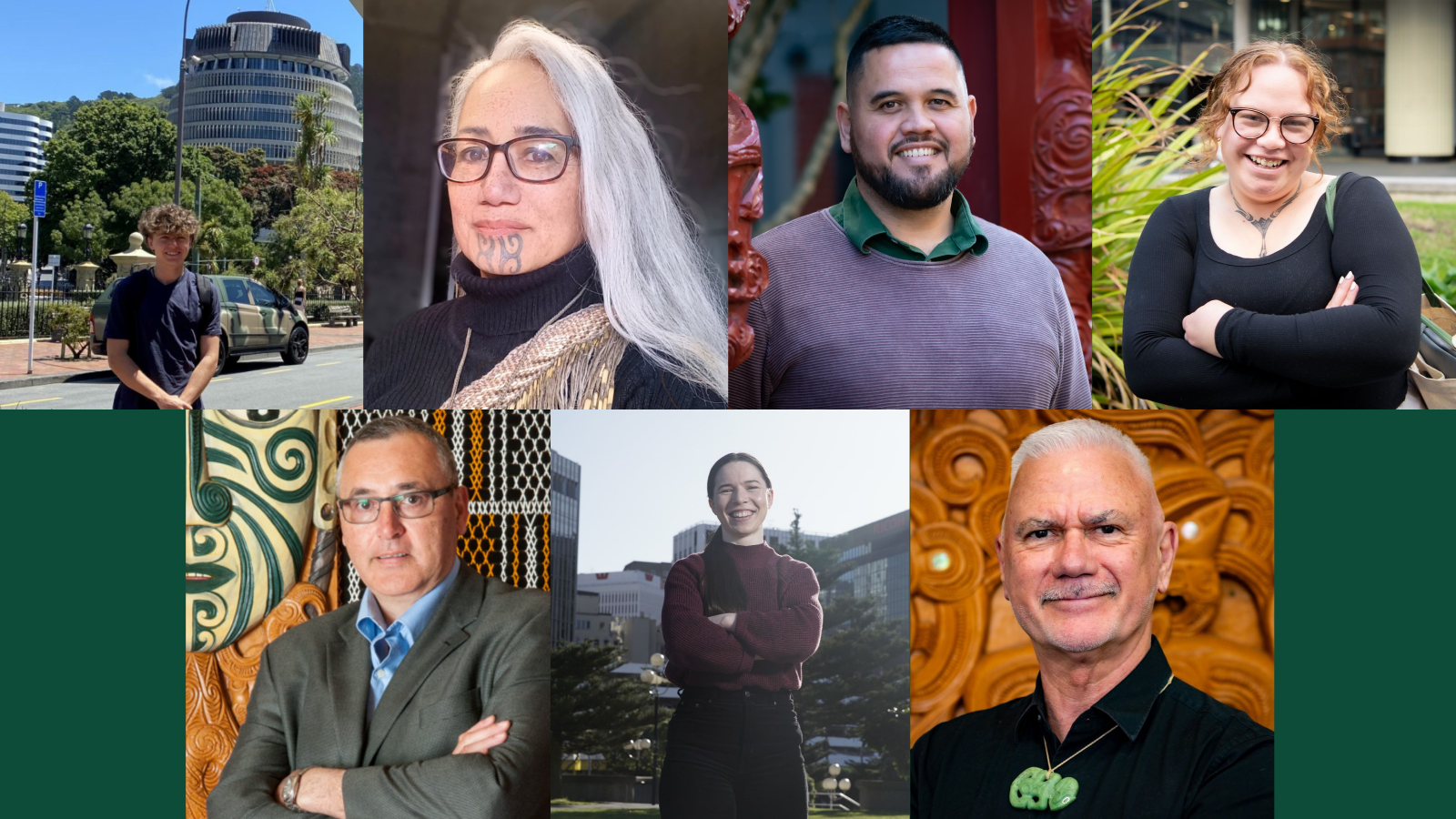
Terran Philippi (Te waka Tainui, Ngāti Koata and Ngāti Kuia)
Terran is in his second year of a Bachelor of Commerce degree in Economics and Finance, and has recently been awarded a Scholarship in Māori Economics from the New Zealand Institute of Economic Research (NZIER). The scholarship is designed to support students who can apply their economics skills, knowledge, and expertise to the Māori economy.
“I love learning about and communicating with new, sometimes completely foreign cultures. I hope to use my experiences and passion to generate better outcomes for Māori and our economy whilst following tikanga Māori.”
Awhina Tamarapa (Ngāti Kahungunu, Ngāti Ruanui)
Dr Tamarapa obtained a PhD in Museum Heritage Studies from Te Herenga Waka this past May. Her PhD looked at the role of museums in the maintenance of Māori weaving as a living cultural practice, and whether or not museums recognise the mana of weavers who hold the mauri of their practice.
“I wanted to look at how museums can best serve Māori people,” she says. “This work enables me to be able to go to places like museums and make connections, to recover mātauranga knowledge that is really important to our communities, and be able to feed back that information. I feel like I’m of service to my people in an area that I’ve spent a long time working.”
Billy van Uitregt (Ngā Rauru, Te Ātihaunui-a-Pāpārangi, Tūhoe)
Dr van Uitregt is part of an emerging collective of hapū and iwi representatives from five ecosanctuaries across Aotearoa are exploring ways to take conservation beyond the predator-proof fences.
“As established ecosanctuaries we often talk about the challenges of trying to retrospectively fit kawa me tikanga (cultural practices and principles) of hapū in how the ecosanctuaries operate. But some of the emerging ecosanctuary initiatives are already hapū- or iwi-led and so can establish themselves with a foundation in the kawa and tikanga of hapū.”
Read more about Dr van Uitregt’s mahi.
Rebekah Bowling (Kāi Tahu)
Rebekah is an Assistant Lecturer in Criminology, and studying towards a PhD in Criminology.
Rebekah's PhD research explores the history of facial recognition, and the related state-corporate categorisation and commodification of indigenous and marginalised groups, particularly focussing on the classification and recording of Māori faces.
“A goal of mine in the next couple of years is to poipoi (nurture) Māori criminology tauira (students) so that we can foster an increase in Māori postgraduate criminologists and undertake more research on justice issues within an indigenous lens,” she says. “I would love to help encourage, support and inspire more criminological research on Māori, by Māori and for Māori to empower and uplift our indigenous communities.”
Peter Adds (Te Āti Awa)
Professor Peter Adds has been teaching at Te Kawa a Māui for the past forty years. The current Māori studies programmes at the University reflect the work that Professor Adds and his colleagues have done, ensuring that the courses and teaching provide students with a solid grounding in Māoritanga and Māori issues to allow the them to eventually contribute positively to Māori development initiatives.
“Being an academic, particularly in the then Department of Māori Studies was a fantastic gig, and alongside that you get to undertake research and work on things you’re interested in.”
Read more about Professor Adds.
Cha’nel Kaa-Luke (Ngāti Ruanui, Ngāruahine, Ngāti Porou)
Cha’nel is currently studying a Master of Indigenous Studies. “I believe I’m one of the first Māori Deaf people to do an Master’s like this. That space comes with a lot of privilege and a lot of fear, as well as pressure.” Cha’nel hopes there will be others to follow, allowing the opportunity for more Deaf and Māori voices in these spaces.
“I want to be able to give back to my community, especially the Māori Deaf community. Studying a Master’s will enable me to further understand the intersectionality between those two spaces.”
Clive Aspin (Ngāti Maru, Ngāti Whanaunga, Ngāti Tamaterā)
Associate Professor Aspin’s research scope focusses on sexuality, HIV, and suicide prevention. Last year, he received the Te Rangi Hiroa Medal for his research into these areas, and his work has been influential in policy development and led to greater equity for Māori and indigenous peoples in Aotearoa New Zealand.
Associate Professor Aspin led a research collaboration into the impact of HIV on indigenous peoples in Aotearoa New Zealand, Australia, and Canada that has positively impacted the development of HIV-related policy in all three nations.
